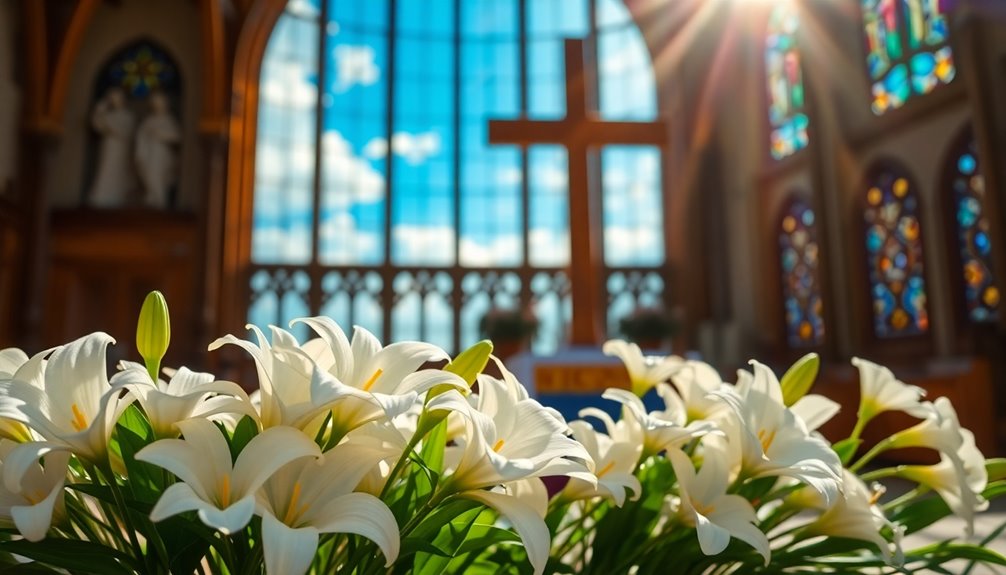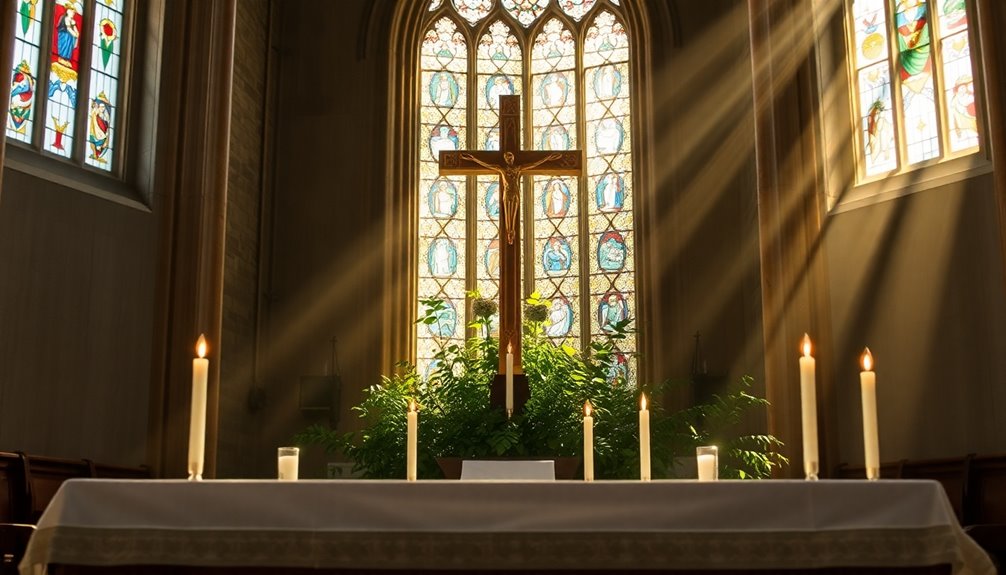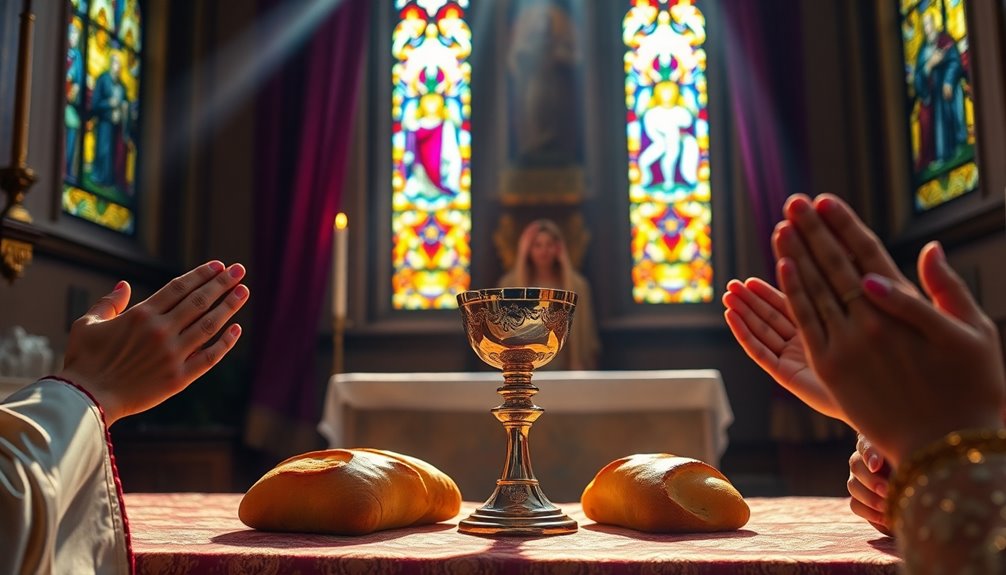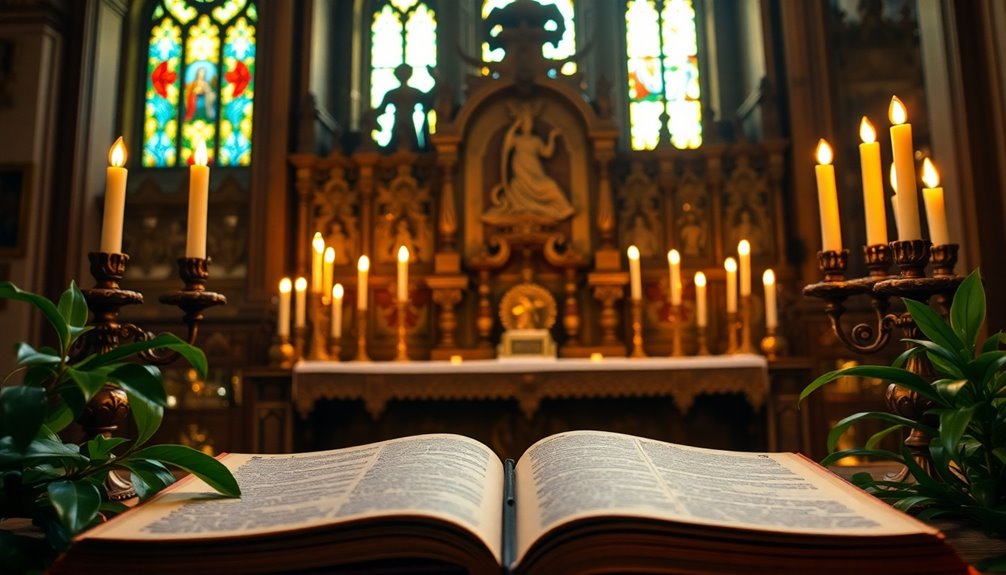To consecrate in the Bible means to set yourself apart for God's sacred purposes. This process isn't just a one-time event; it's an ongoing journey that requires daily commitment and transformation. You're called to cleanse your heart and align your actions with God's will, deepening your relationship with Him. Throughout Scripture, from the Old Testament to the New, the theme of consecration appears, emphasizing the importance of living in a way that reflects God's holiness. Exploring this concept further can enlighten your spiritual growth and strengthen your connection with the divine.
Key Takeaways
- Consecrate means to set apart for sacred purposes, signifying a commitment to holiness and spiritual growth.
- The Hebrew term "qds" appears over 260 times in scripture, emphasizing the importance of consecration.
- Consecration involves personal cleansing and ongoing renewal, not just a one-time event.
- In worship, consecration includes dedicating people and offerings to God, as illustrated in Levitical practices.
- New Testament references affirm believers as a chosen generation, emphasizing their role in living a consecrated life.
Introduction

In the Bible, the concept of consecration plays a crucial role in understanding the relationship between God and His people. To "consecrate" means to set apart individuals, objects, or time for sacred purposes, signifying a commitment to holiness and devotion to God. The Hebrew term "qds," often translated as consecrate or sanctify, emphasizes this separation, appearing over 260 times in scripture.
Biblical examples highlight that consecration often involves personal cleansing or repentance before approaching God. For instance, in Exodus 13:2, God commands the consecration of the firstborn, while Numbers 3:12 illustrates the setting apart of the tribe of Levi for priestly duties. These practices underline the seriousness of dedicating oneself to God's service.
In the New Testament, this theme continues as 1 Peter 2:9 reminds you that as a Christian, you're part of a chosen people, called to live in holiness and set apart for God's purpose.
Understanding consecration not only deepens your faith but also clarifies your role in a divine relationship, inviting you to actively engage in a life dedicated to God's glory.
Scriptural Basis for Consecration

When you explore the scriptural basis for consecration, you'll find key references that highlight its significance.
The primary Bible verses illustrate how God calls His people to be set apart, while secondary passages expand on this theme throughout Scripture.
Understanding these points will help you grasp the depth of what it means to be consecrated in your faith.
Primary Bible References
Consecration embodies the act of setting apart for divine purposes, a theme prevalent throughout the Bible. In Exodus 13:2, God commands His people to consecrate the firstborn, emphasizing the importance of dedicating what's valuable to Him.
Similarly, Numbers 3:12 illustrates how the Levite tribe was consecrated to the Lord, setting them apart for the unique service of God in the tabernacle. This highlights their role in Israel's worship and their commitment to holiness.
Leviticus 27:28-29 further expands on this concept, providing guidelines for dedicating possessions, including fields and livestock, reinforcing the idea that all things belong to God and should be treated as sacred.
In the New Testament, 1 Peter 2:9 reminds you that as a believer, you're part of a "chosen generation" and a "royal priesthood." This consecrated status calls you to live a life of holiness and service.
Finally, Joshua 3:5 urges you to sanctify yourselves before witnessing God's miraculous deeds, demonstrating that preparation through consecration is essential for experiencing His blessings.
Embracing these biblical principles encourages you to live set apart for His glory.
Secondary Bible References
Throughout the Bible, we often see various individuals and objects set apart for divine purposes, showcasing the significance of consecration. In Exodus 13:2, God commands you to consecrate the firstborn, emphasizing that they're sacred and belong to Him.
This theme continues in Numbers 3:12, where the tribe of Levi is chosen specifically for the service of the priesthood, highlighting their role in worship.
Leviticus 27:28-29 extends the concept of consecration to personal resources, urging you to dedicate fields and livestock to God. This act illustrates your devotion by recognizing that everything you have ultimately belongs to Him.
In the New Testament, 1 Peter 2:9 describes you as part of a "chosen generation," reinforcing the idea that you're a holy people set apart for God's purposes.
The rituals associated with consecration—such as washing, anointing, and the laying on of hands—symbolize your transition from the secular to the sacred.
Ancient Israelite Sacrificial Practices

In ancient Israel, sacrificial practices played a vital role in the community's relationship with God, emphasizing the importance of consecration. These practices set apart animals and offerings for God's service, as detailed in Leviticus 1-7. You'd find various types of offerings, including burnt offerings, peace offerings, and sin offerings, each representing different aspects of devotion and atonement.
Priests were crucial in this system, performing sacrifices and mediating between God and the people. Their role highlighted the significance of consecrated individuals within the worship practices of ancient Israel. You'd see the blood of sacrificial animals sprinkled on the altar, symbolizing the sanctification of both the offering and the worshiper, as illustrated in Exodus 24:6-8.
Additionally, the practice of dedicating firstborn animals and the Levites as a holy priesthood, described in Exodus 13:2 and Numbers 3:12, illustrated the deep connection between consecration and sacrificial worship.
These rituals not only expressed devotion but also reinforced the community's commitment to living a sanctified life, reflecting their unique covenant with God.
Consecration's Role in Worship

Setting apart people, places, and things for divine service is essential in worship. Consecration emphasizes the sacred nature of these elements, as seen in Exodus 30:29, where anointing oil consecrates the tabernacle and its furnishings.
In the New Testament, you're called to present yourself as a living sacrifice, holy and acceptable to God, reflecting the essence of consecration found in Romans 12:1.
Rituals play a significant role in this process. For instance, the laying on of hands, as illustrated in Acts 13:3 during the commissioning of Paul and Barnabas, signifies the transfer of God's authority and blessing. Such rituals ensure that both leaders and spaces are set apart for divine purposes.
Worship practices in the early church also included consecration rituals for bishops and church buildings, reinforcing the historical tradition of dedicating sacred spaces for God's work.
Hebrews 10:19-22 encourages you to draw near to God with a sincere heart, linking personal consecration to communal worship. By understanding and engaging in these acts of consecration, you participate in a profound spiritual journey, recognizing the holiness of your devotion and the sacredness of the worship environment.
Misunderstanding Consecration's Significance

When you think about consecration, it's easy to see it as just another ritual, but that misses its deeper meaning.
Many cultural misunderstandings can cloud your view, making you overlook the personal commitment and transformation it requires.
Let's unpack these misconceptions and explore what true consecration really involves.
Debunk Common Misconceptions
While many people think of consecration as a one-time event, it's actually an ongoing journey that requires daily renewal and commitment to living a life set apart for God. This process involves a profound spiritual transformation that affects every aspect of your life.
It's not just about ceremonies; it's about genuinely dedicating yourself to ethical living and the pursuit of holiness.
You might believe that consecration applies only to religious leaders or specific objects, but the Bible clearly states that all believers are called to be holy people (1 Peter 2:9). Every day, you have the opportunity to recommit to this calling.
Some may focus solely on physical rituals, missing the deeper significance tied to repentance and the ethical choices you make. True consecration goes beyond mere actions; it's about aligning your heart with God's will.
Moreover, understanding the relationship between consecration and God's promises is crucial. When you fully embrace this commitment, you open yourself to experiencing God's miraculous interventions and blessings in your life (Joshua 3:5).
Embrace this journey, and witness how it transforms your life in extraordinary ways.
Cultural Misunderstandings of Consecration
Misunderstanding the significance of consecration often stems from cultural influences that trivialize its true meaning. Many people see consecration as a mere ritualistic act, overlooking its essence as a commitment to a sacred purpose.
This misunderstanding can lead you to view consecration as optional rather than essential for your spiritual growth and relationship with God.
You might mistakenly think of consecration as a one-time event, rather than an ongoing process that calls for your surrender and dedication to God's will.
Modern secular values often eclipse the call to be set apart from worldly influences, making it easy to conflate participation in church activities with true consecration.
However, true consecration involves a profound inner transformation and living as a living sacrifice, as emphasized in Romans 12:1-2.
Daily Devotion Practices

Daily devotion practices are essential for nurturing your relationship with God. Incorporating daily prayer and reflection into your routine can deepen your spiritual life, while participating in group prayer initiatives fosters community and accountability.
Let's explore how these practices can transform your faith journey.
Daily Prayer and Reflection
In your journey of faith, daily prayer and reflection are vital practices that help you maintain a consecrated life. By engaging in daily prayer, you align your thoughts and actions with God's will, fostering a deeper relationship with Him. Setting aside specific times each day to communicate with God encourages spiritual growth and reinforces your commitment to live for His purpose.
Incorporating Scripture into your daily devotionals can enhance your understanding of God's nature. Passages like Psalm 1:1-3 remind you of the blessings that come from meditating on His law. As you reflect on these teachings, you grow spiritually, drawing closer to God.
Thanksgiving is another essential element of daily prayer. Recognizing God's sovereignty and grace in your life cultivates a heart of gratitude, deepening your relationship with Him.
Consider journaling your reflections on daily prayers and insights from Scripture. This practice serves as a powerful tool for accountability, helping you track your journey of consecration over time. Additionally, engaging with the Deaf community through sign language can enhance your ability to share your faith and connect with others.
Ultimately, daily prayer and reflection nurture your spiritual growth, enabling you to live a life devoted to God and His service.
Group Prayer Initiatives
Group prayer initiatives offer a powerful opportunity for believers to unite in their commitment to spiritual growth and consecration. These collective consecration efforts create a shared environment where everyone is encouraged to deepen their relationship with God.
By regularly participating in daily devotion practices, you engage with Scripture, which not only enhances your understanding of what it means to be consecrated but also builds a stronger community.
Through group prayer, you and your fellow believers hold each other accountable for your spiritual journeys. This accountability fosters a sense of unity, ensuring that everyone remains focused on their dedication to God's purposes.
Incorporating worship and praises during these initiatives helps elevate the atmosphere, allowing for a deeper reverence and connection to God.
Moreover, establishing a rhythm of regularly scheduled group devotions can transform your spiritual life. It encourages you to actively and intentionally live out your faith throughout the week.
As you participate in these group prayer initiatives, you'll find that your commitment to spiritual growth and collective consecration strengthens, enriching both your life and the lives of those around you.
Consecration Fosters Spiritual Growth

Consecration plays a vital role in fostering spiritual growth for anyone seeking a deeper relationship with God. By committing to set yourself apart for His service, you cultivate a mindset that renounces worldly influences, as seen in Romans 12:1-2.
When you engage in daily practices like prayer and meditation on Scripture, you nurture your connection with God and align your will with His (Psalm 1:1-3).
Biblical examples, such as the Israelites consecrating themselves before crossing the Jordan (Joshua 3:5), show that acts of obedience often lead to significant spiritual growth.
Embracing consecration invites accountability within your faith communities, which fosters mutual encouragement and support on your spiritual journey (Hebrews 10:24-25).
Living a consecrated life also emphasizes reflecting God's holiness in your daily actions.
New Testament teachings highlight that your obedience and commitment to God can lead to spiritual maturity (1 Peter 2:9-10).
As you pursue consecration, you'll discover that it not only deepens your relationship with God but also strengthens your bonds within your faith community, creating a powerful environment for spiritual growth.
Additional Resources

To deepen your understanding of consecration and its significance in the Bible, various resources can enhance your study. Begin by exploring biblical commentaries that provide insights into the term "consecrate," derived from the Hebrew word "qds," which means setting apart for sacred purposes.
Look for passages such as Exodus 13:2, where the dedication of the first-born underscores this principle. You might find it valuable to read about the concept of the "chosen generation" in 1 Peter 2:9, which emphasizes how believers are set apart for God's service.
Additionally, consider studying the historical context of consecration practices among the Levites in Numbers 3:12 to understand their priestly duties and how these practices shape our understanding of holiness today.
Devotional books and articles can guide you in applying the principles of consecration in your life, encouraging you to reflect on your dedication to God. Engaging with these resources will help you grasp how living a life of holiness connects you to your sacred purpose, enabling you to fully embrace your role as part of God's chosen generation.
Frequently Asked Questions
What Does It Mean to Consecrate Yourself to God?
To consecrate yourself to God means you're dedicating your life for His service.
It's about setting aside your former ways and choosing to live in alignment with His will.
You're committing to spiritual growth through daily practices like prayer and engaging with Scripture.
This act symbolizes a new beginning, reflecting your total devotion and readiness to follow His commands, ultimately shaping your identity as part of His holy priesthood.
What Is an Example of Consecration?
An example of consecration is when you set something apart for a sacred purpose. For instance, think about the Israelites consecrating their firstborn males, dedicating them to God as a sign of devotion.
You might also consider when they purified themselves before crossing the Jordan River, highlighting the importance of spiritual readiness.
This practice of dedicating people and things shows a commitment to a higher calling, emphasizing the significance of spiritual devotion in your life.
What Is the Biblical Meaning of Sanctification?
Sanctification in the Bible means being set apart for God's purposes.
It's a journey where you grow in holiness through obedience and the Holy Spirit's guidance. You're not just made holy positionally; you're called to live it out daily.
This process transforms you, urging you to offer your life as a living sacrifice.
Embracing sanctification helps you reflect God's holiness and strengthens your relationship with Him and others.
What Happens When You Consecrate Something?
When you consecrate something, you're setting it apart for a special purpose.
This act involves dedicating the item or person to a higher calling, which often leads to transformative changes. You might perform rituals, like anointing or prayer, to signify this dedication.
Once consecrated, the object or individual is expected to reflect this new status, living in alignment with the principles and values that come with being set apart for a sacred mission.










